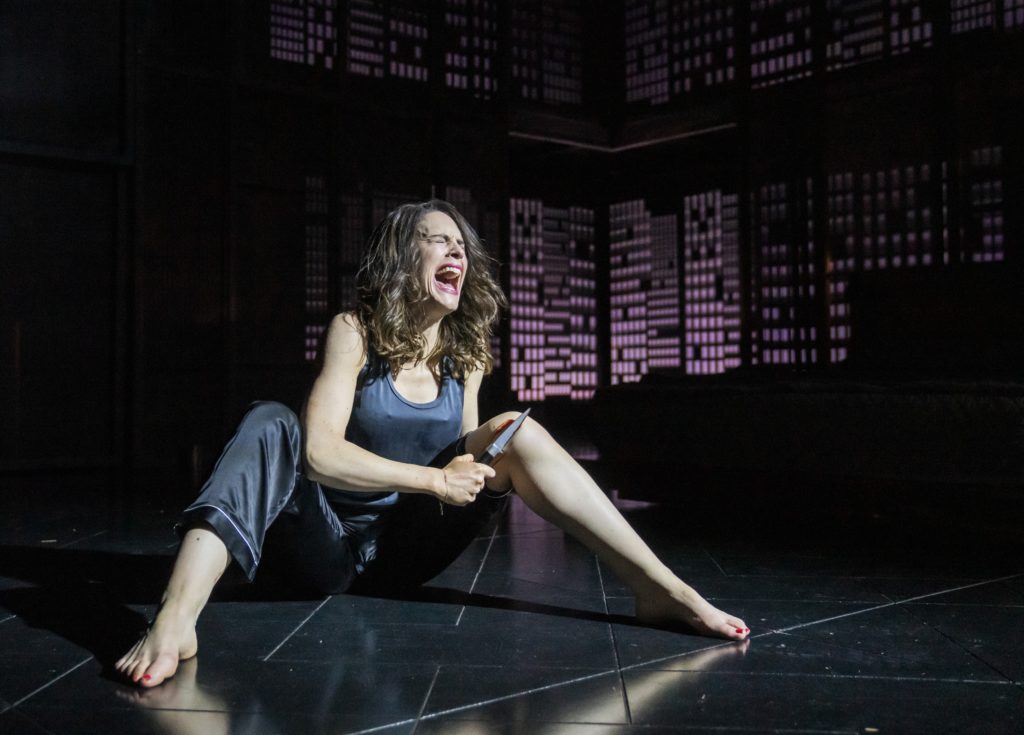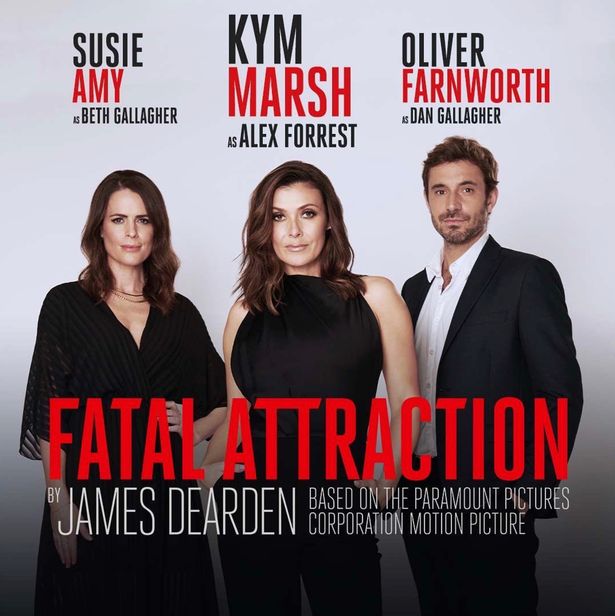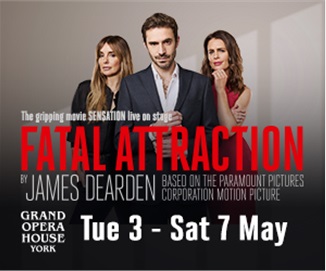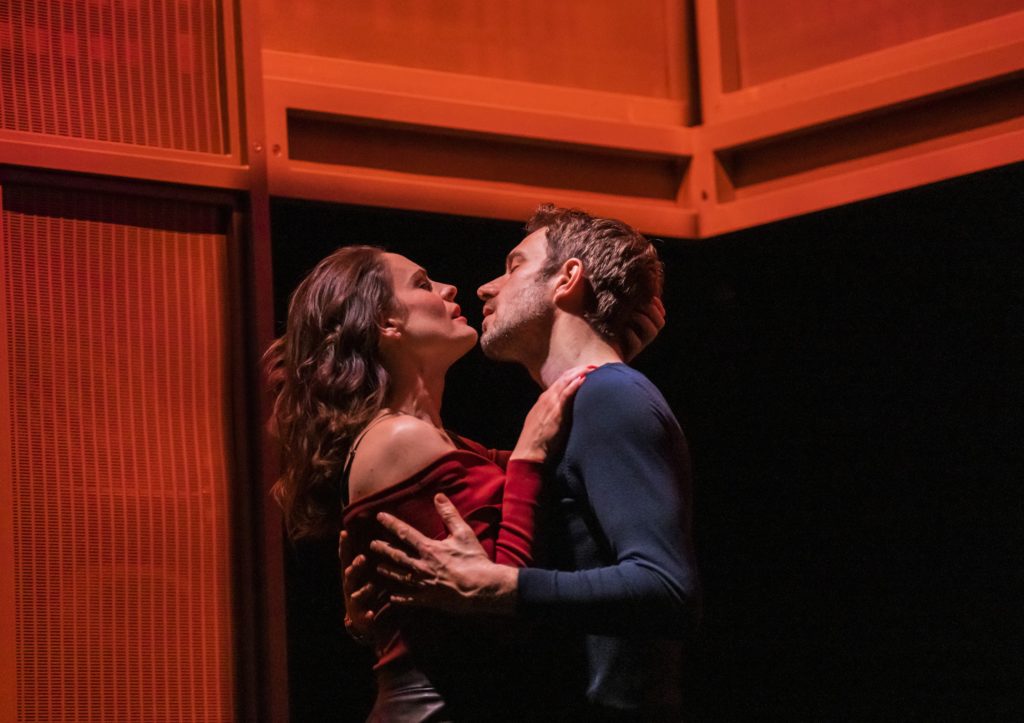
Fatal Attraction, by James Dearden, Grand Opera House, York, 7.30pm tonight; 2.30pm, 7.30pm, Saturday. Box office: 0844 871 7615 or atgtickets/York
JAMES Dearden revisits his script for Adrian Lyne’s “bunny boiler” movie, the Paramount Pictures psychological thriller where it was fatal to get too close to Glenn Close’s Alex Forrest.
Dearden does not merely plonk it on stage. Instead, he moves it forward from 1987 to today’s world of #MeToo, greater awareness of mental health, all-pervasive technology (constantly name-checked to prove the point), but where men’s entitled behaviour has not changed.
He tells the same story with better balance but, frustratingly, not better dialogue in climactic scenes, brought to stage life with directorial swagger by Loveday Ingram, an outstanding, hi-tech set design by Morgan Large and projections by Mogzi.
Then add the box-office magnet of a celebrity cast of a Footballers’ Wives goddess (Susie Amy), a soap star (Oliver Farnworth, from Coronation Street and Hollyoaks) and a girl group favourite and Strictly runner-up (Eternal’s Louise Redknapp), each assuming a generic American accent that largely stays that side of the Pond.
They are not playing to big houses, suggesting Fatal Attraction may have lost its sex-sells allure since 1987 or lacks sufficient curiosity value in its transfer to the stage, or has been consigned to the past like so many DVDs and videos at a car boot sale.
Nevertheless, Dearden, Ingram, the production team and cast, sound designer Carolyn Downing and composer Paul Englishby have committed wholly to justifying its return. Dearden even comes up with a Sliding Doors coda, a little awkwardly delivered but worth it all the same.
If Fatal Attraction has slipped from memory or never been a Close encounter of the psycho kind for you, here is a quick refresher course. Farnworth’s Dan Gallagher – a happily married New York attorney with a daughter (unseen, voiced by Charlotte Holden) – narrates the torrid tale of his two-night stand with Amy’s Alex Forrest, the mysterious woman at the basement bar he “befriends”.
Wife Beth (Redknapp) is away in the country for the weekend, and as the drinks clink, the strangers click, Downing’s sound design pounds away, and soon Dan and Alex are too, with every last theatre light turned off. Sound and vision work to best effect here.
Dan might think everything can be washed away with a change of shirt, the fling flung, the dirty deed done, but Alex has other ideas. If there are rules, you play by hers, and here is a woman scorned. A woman, too, whose carapace of confidence in the bar turns out to be fragile, a front to cover loneliness.
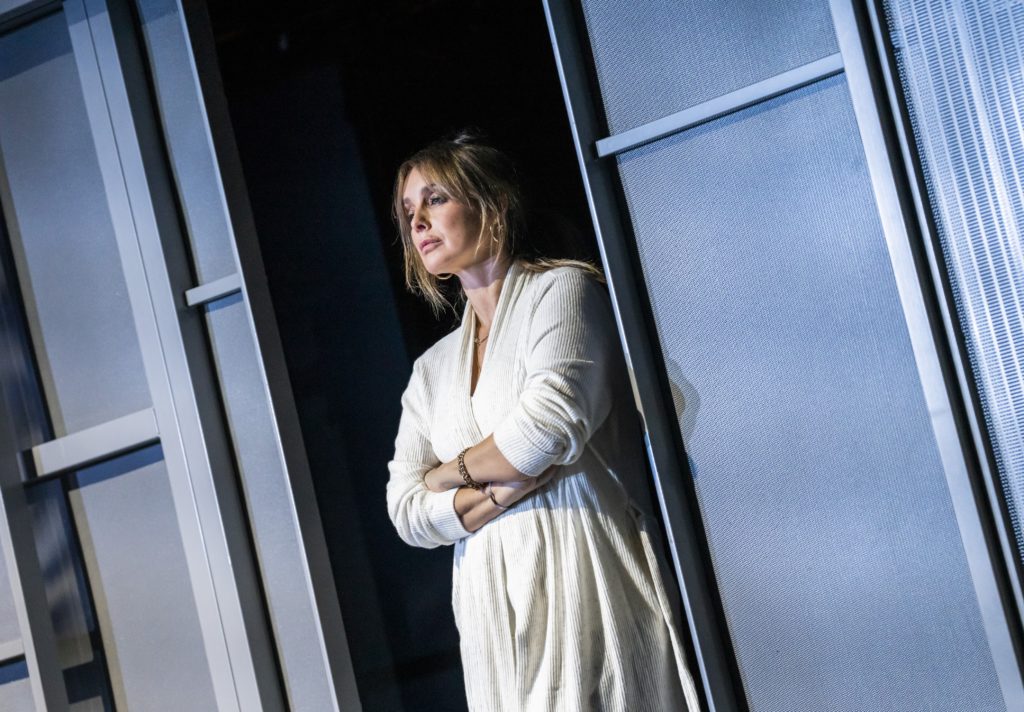
Alex still goes down the bunny boiler path, but Dearden refracts her actions through the prism of our better understanding of mental illness, and the assured Amy has switched impressively from playing Beth in the tour’s first leg to bringing a more rounded humanity to the deeply troubled Alex, her more considered interpretation having none of the Hollywood histrionics of Close.
Farnworth never quite shakes off being an Englishman playing a New York American, but he captures the oily charm but nonchalant arrogance and misogynism of the smart but outsmarted lawyer.
Who is the victim here? Mentally wounded, self-harming, jilted Alex? Dan, who took a chance that backfired? Or Redknapp’s wronged wife, Beth, who had given up her better-paid job to dedicate herself to husband, child and nest-building, making pasta sauce for Dan before heading up country?
The answer is all three in Dearden’s 2022 version, although he has written the cut-and-thrust scenes for Alex and Dan rather better than those for Dan and demure Beth, especially the far-too-rushed confession and confrontation over his infidelity.
Heat and tension, and later exhaustion, rise from Alex and Dan’s encounters. By contrast, Beth’s hurt is under-powered, unconvincingly reduced to being too reliant on a few expletives as if one eye were on the running time. She deserved better, not just in her husband, but in that let-down of a melodramatic climactic scene.
Put that one down to Dearden but Ingram’s direction errs in the tone of the bunny boiler set-piece, set up deliciously, even with a hint of knowing mischief, only to go off the boil and fizzle out into unintentional comedy. Not for the only time, the pacing is not right – even in the tour’s last week – and momentum is stalled.
Consistently excellent, however, is Large’s set design, one that enables a slick transfer of locations through a fusion of multiple screens and a box-of-tricks structure that allows for furniture to emerge, entrances to be created. Then call on Mogzi’s projections to conjure all manner of imagery, internal, external, urban and upstate, most spectacularly a speeding car heading out of control.
To further emphasise the 21st century refurb, mobile phonecalls and video calls are relayed on those screens too. The overall effect of this deliberate visual overload is to mess around with your head, just as Dan and Alex are doing to each other, all the while blurring and twisting reality beyond Dan’s narrative control.
Fatal Attraction, the stage play, is the proverbial curate’s egg: direction hit and miss; design top drawer; performances enjoyable; the writing alive to a changed world but sometimes misfiring, not least an overworked “Tired of London/Tired of New York” simile.
Yet everything ultimately boils down to whether it works as a psychological thriller, one that gets you both hot and bothered, shocks and surprises you, and while it comes within a knife’s length of doing so, in the big moments, the ones that really matter, it falls tantalisingly short.

